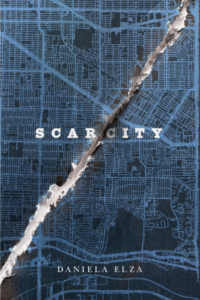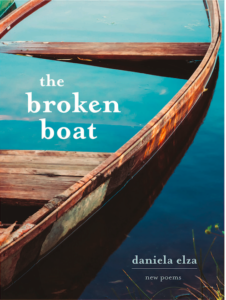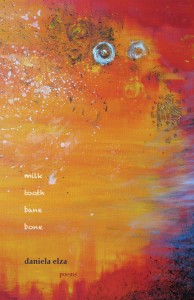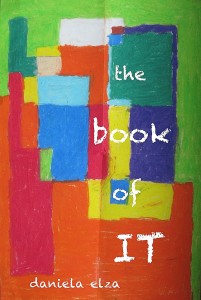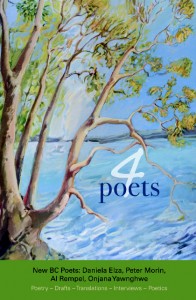a heart of wisdom
Posted by Daniela Elza on Oct 19 2012
Happy October. It has been a good year. A very busy year. Maybe just beginning to feel things slow down a bit. Maybe tomorrow. Maybe after the next submission. Which is how I will get over today’s rejection. Maybe…
So it’s harvest time.
A Heart of Wisdom has been a few years in the making. I hear it is out now. I have a chapter in it of poetry/stories/prose on listening to children, titled The Shape of Questions. All this in my pursuit of gaining better understanding of the child consciousness. As a poet that appeals to me, attracts me and whispers uncountable wisdoms. (A lot more than the adult consciousness I have been encountering of late. Too late.)
What is it we do not get about children—only half seen, some barely seen, and some perhaps never? Children should be seen, we say, and heard, I say. And as much of it as we can handle. How do we know who and what they are before we commit to changing them into what we think they should be? If according the Alison Gopnik they are more conscious than we are, are we not interested in how we can be more conscious too? Anyway…it is a big topic.
Looking forward to holding a copy in my hands. I will receive a copy, right, publisher Peter Lang?
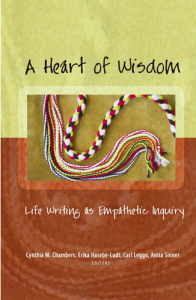
A Heart of Wisdom: Life Writing as Empathetic Inquiry. Co-edited by Carl Leggo, Erika Hasebe-Ludt, Anita Sinner, & Cynthia Chambers (Peter Lang International Academic Publishers, 2012).
Soft cover, and hard cover and international.
Brief synopsis of the book (from the publisher’s website).
“This anthology explores life writing as a mode of educational inquiry, one where students and teachers may get a «heart of wisdom» as they struggle with the tensions and complexities of learning and teaching in challenging contemporary circumstances. Contributors write first-person creative non-fiction in a variety of life-writing genres, such as memoir, poetry, personal essay, and various blended genres. Four sections entitled Memory Work, Place Work, Curriculum Work, and Social Work explore the struggles and joys of pedagogy where relationships are at the heart of teaching and learning. The essays address questions such as: What critical moments in learning and teaching change lives? What stories need to be told? What questions ache to be asked?”
I have been thinking how diversified my publications are. I love that. I am publishing in Canada and outside of Canada, in literary and academic/peer-reviewed publications. In online and print journals/magazines. I have an eBook, and print books, and quite a few anthologies. It is what I wanted.
People want to know what kind of writer I am. It is really not for me to say, is it? I just write that which begs to be written and in the way that it plays to be written. That is where I see my work. After that we part. If I were to judge it, will I not be tempted to put it in a neat category? Makes for better judging, does it not? But I do not write for the critics, or the judges. Maybe it is good to say that upfront. I am simply not interested in that. I am interested in poetry. Where it dwells, where it lives, and I have also discovered it is really not a fashion freak. That appeals to me.
When reviewers review my work they want to place me, fit me with a category. But I do not fit snug in the language poets, or just lyric poets, or just academic poets or just… They want categories, contextualizations. It is a lot easier to shoot at categories. It is human.
But I like to construct, while I deconstruct. Sorry. I do feel I have a responsibility to my reader. I try to play and hope my play is not at the expense of the poem, just a layer of it.
And I am cognizant that I do ask a lot of my reader. But do not despair. I ask a lot of myself too. Like for instance I have not yet managed to read everything I put on the page. I hope to, one day. I might need more voices for that. Back up voices. Echoes. I never want to get bored of my own work.
If I wanted to be categorized I would have worked toward fitting a category. I lost interest in that long time ago. Now, if you want to look for me you will find me in the inbetweens. One foot here, one foot there. Poetry does not care for categories. Which is a good dwelling place for the poet in me. Which makes my relationship with poetry perfect. Good luck with the categories, if you dare.
